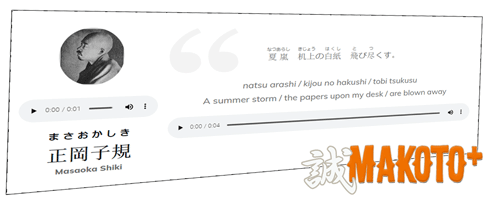Happy Sunday! Today, we will dissect another poem for a hot summer day. So, grab a cup of coffee and let's dig in!
----
But first, a recap on the week
All free except the new Makoto+ Idioms Online Course!
- FRIDAY: Two new modules added to the Idioms Course - become a Makoto+ member today [UPPER BEGINNERS] Get it now while it is still cheap!
- THURSDAY: New podcast: Beginning Japanese Phrases Podcast Phrases 92: ~てみる try and…; to try (to do) [BEGINNERS]
- MONDAY: The Makoto+ Letter #9: What I Wish I had Known as a Beginner: On Learning Japanese Vocabulary [BEGINNERS+]
- MONDAY: New podcast: Nihongo no Tane 94 認知症予防 Preventing Dementia | Japanese Immersion Podcast What steps can you take to prevent dementia? As Yumi explains, you are already doing a big one: learning Japanese! [INTERMEDIATES]
Last week, we spent a lot of time on the new Idioms Course modules. This week, we'll release the next month's issue of Makoto. Next week, I am planning to release another module for the Japanese Names Course. がんばりましょう!
----
And now, today's Sunday Haiku:
Today's haiku is by 久保田 万太郎【くぼた まんたろう】. Kubota Mantarou (1889-1963) was a Japanese author, playwright, and poet.
I don't know about where you are living, but it is hot here in Florida. Really hot. Today's haiku expresses the weakness overheating can cause but with a comical twist: we are really talking about a handheld fan.
Makoto+ Shogun or Lifetime members, click here for today's haiku with sound and almost 100 other haiku lessons. (Not yet a member, let's fix that!)
Haiku lesson
Let's get right to it.
へなへなに 腰のぬけたる 団扇かな。
VOCABULARY
- へなへなに flimsy; floppy; droopy [へなへな (describes how something is “flimsy” or “bending back and forth easily”); に here makes へなへな into adverb modifying the verb (腰のぬけたる)]
- 腰のぬけたる (a fan) which has become weak; (a fan) which lost its strength [from 腰が抜ける which literally means, “hip has fallen off”; classical Japanese form of 腰が抜けた (became weak); it really means “lower back comes out” and it basically means “to become weak” or “to lose strength”; this phrase is also used when a sudden shock or scare makes someone freeze and unable to get up.]
- 腰 hip; lower back [This came from an idea in Japan that a strong hip is the key to the strength and stability for the lower limbs; there are many expressions using 腰 in this way.]
- の [same as が (subject marker) which can be replaced with の only in dependent (subordinate) clause in modern Japanese. This usage of の in place of が as the “main subject marker” is seen often in classical Japanese poems]
- ぬけたる (a fan) which has lost its strength [classical from ぬける (to fall off; to come off); ぬけたる is most likely the classical version of ぬけた or ぬけている (ぬけて + いる)]
- 団扇 paper handheld fan
- かな classical copula [adds emphasis to the end the poem. Often comes at the end after a single noun.]
季語【きご】 Season Word
What is the 季語【きご】? It is 団扇【うちわ】 which is a handheld paper fan used to cool off in the hot summer.
Interpretation
There is a Japanese expression, 夏バテ【なつばて】, which means "to suffer from summer heat" or "summer heat fatigue."
Have you ever been out in the sun on a hot day, pouring in sweat, and not feeling like doing anything? You begin to feel weak and unable to stand up strongly.
The beginning of this haiku feels like that, but there is a little twist to this haiku.
If you only make it two-thirds through the poem, it sounds like we are talking about a person weak and flimsy from the heat.
へなへなに means "easy to bend" or "weak" or "flimsy." and 腰のぬけたる implies one's back has given out and you are weak in the knees. It's hot, you feel like a noodle, unable to stand tall.
But then, the twist. We aren't talking about a person, but the poet's 団扇【うちわ】.
The above painting shows an 団扇【うちわ】. It is by an artist named 黒田 清輝【くろだ せいき】 (1866-1924).
Let's read the poem one more time:
へなへなに 腰のぬけたる 団扇かな。
hena hena ni / koshi no nuketaru / uchiwa kana
Flipping-flopping back and forth weakly / completely worn out / my fan
The へなへな gives the poem a playful nuance, especially since it is used to describe an (old) fan. Therefore, we opted for a playful, "flipping flopping back and forth weakly."
What's your take? Hit reply and let me know.
If you are a Makoto+ Shogun or lifetime member, click here to see this lesson with audio. [Sorry, the Samurai level doesn't have access to past haiku lessons.]
Like this haiku lesson? Did you know we have almost a hundred other haiku lessons on Makoto+ now? All have vocabulary and grammar breakdowns with sound and cultural notes. Shogun and lifetime members have unlimited access to all lessons.







